高级英语词汇辨析
高考高中英语易混淆50组重点词语分类辨析+例句汇总
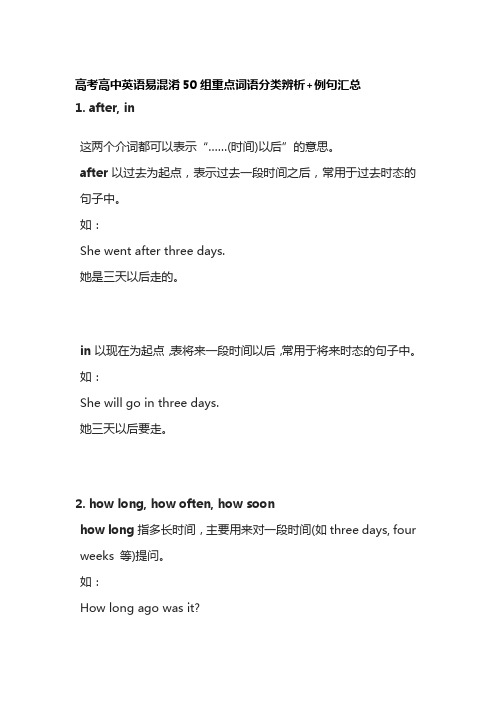
高考高中英语易混淆50组重点词语分类辨析+例句汇总1. after, in这两个介词都可以表示“……(时间)以后”的意思。
after以过去为起点,表示过去一段时间之后,常用于过去时态的句子中。
如:She went after three days.她是三天以后走的。
in以现在为起点,表将来一段时间以后,常用于将来时态的句子中。
如:She will go in three days.她三天以后要走。
2. how long, how often, how soonhow long指多长时间,主要用来对一段时间(如three days, four weeks 等)提问。
如:How long ago was it?这是多久前的事了?how often指每隔多久,主要用来对频率副词或状语(如once a week等)提问。
如:—How often does he come here? —Once a month.他(每隔)多久来一次?每月一次?how soon指再过多久,主要用来对表示将来的一段时间(in an hour, in two weeks 等)提问。
如:How soon can you come?你多快能赶来?3. few, a few, little, a little, several, somefew 和little的意思是否定的,表示“很少”或“几乎没有”;而a few和a little的意思是肯定的,表示“有一些,有一点儿”。
few 和a few修饰可数名词;little 和a little 修饰不可数名词。
several用于修饰可数名词,语意比a few和some更肯定,含有“好几个”的意思。
some可修饰可数名词,也可修饰不可数名词,从数量上说,它有时相当于a few 或a little,有时指更多一些的数量。
4. the other, anotherthe other指两个人或事物中的“另一个”,表示特指。
高级英语词语辨析
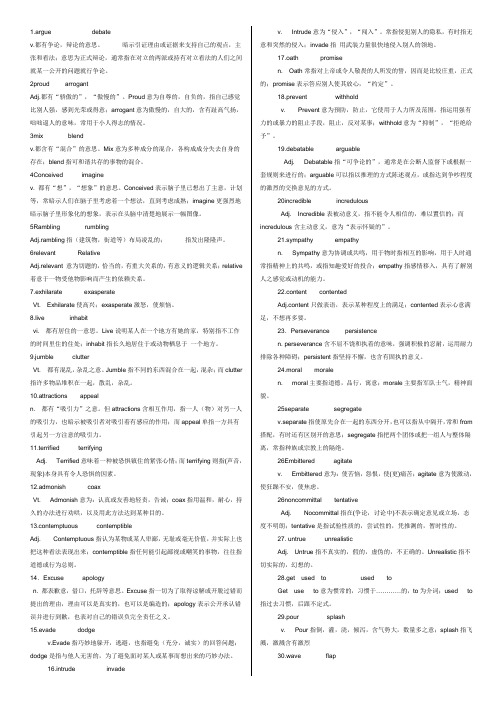
1.argue debatev.都有争论,辩论的意思。
暗示引证理由或证据来支持自己的观点,主张和看法;意思为正式辩论,通常指在对立的两派或持有对立看法的人们之间就某一公开的问题就行争论。
2proud arrogantAdj.都有“骄傲的”,“傲慢的”。
Proud意为自尊的,自负的,指自己感觉比别人强,感到光荣或得意;arrogant意为傲慢的,自大的,含有趾高气扬,咄咄逼人的意味,常用于小人得志的情况。
3mix blendv.都含有“混合”的意思。
Mix意为多种成分的混合,各构成成分失去自身的存在;blend指可和谐共存的事物的混合。
4Conceived imaginev. 都有“想”,“想象”的意思。
Conceived表示脑子里已想出了主意,计划等,常暗示人们在脑子里考虑着一个想法,直到考虑成熟;imagine更强烈地暗示脑子里形象化的想象,表示在头脑中清楚地展示一幅图像。
5Rambling rumblingAdj.rambling指(建筑物,街道等)布局凌乱的;指发出隆隆声。
6relevant RelativeAdj.relevant 意为切题的,恰当的,有重大关系的,有意义的逻辑关系;relative 着意于一物受他物影响而产生的依赖关系。
7.exhilarate exasperateVt. Exhilarate使高兴;exasperate激怒,使烦恼。
8.live inhabitvi. 都有居住的一意思。
Live说明某人在一个地方有她的家,特别指不工作的时间里住的住处;inhabit指长久地居住于或动物栖息于一个地方。
9.jumble clutterVt. 都有混乱,杂乱之意。
Jumble指不同的东西混合在一起,混杂;而clutter 指许多物品堆积在一起,散乱,杂乱。
10.attractions appealn. 都有“吸引力”之意。
但attractions含相互作用,指一人(物)对另一人的吸引力,也暗示被吸引者对吸引着有感应的作用;而appeal单指一方具有引起另一方注意的吸引力。
高级英语全书词义辨析

高级英语上册:u21.sight:普通用词,与eyesight同义,可换用,指由实实在在的事物引起的视觉。
glance:瞥见2.relevant:adj.有关的, 切题的relative:adj. 相对的;有关系的;成比例的3.exhilarate:使兴奋exasperate:生气的4.liveinhabit住。
5.wholesome:adj.有益健康的,多指能给人留下身体健康、思想健全或品德良好等印象。
noisome:adj. 恶臭的;有害的,令人不愉快的6.jumble:混杂;搀杂clutter:使凌乱;胡乱地填满eg:clutter sth up/withodds and ends:各种各样7.idealistic:理想主义的ideal:理想的;完美的;想象的;不切实际的8.attraction:吸引, 吸引力, 诱惑力appeal:呼吁,恳求;有吸引力,迎合爱好;诉诸,求助;上诉;(体育比赛中)诉诸裁判make appeal tou41.evade:规避(责任,问题)dodge:闪躲2.drowned out:淹没,压过stopped:停止3.intruding:强加,干涉,冒犯invading:侵略,侵袭,涌入4.omission:省略,疏忽exclusion:拒绝,排除5.oath:誓言promise:允诺,许诺6.preventing:预防withholding:扣留,不给予7.debatable:无法定论,很难说arguable:有待证实8.credible:adj. 可靠的,可信的believable:adj.令人信服的,逼真的u5:1.incredible:难以置信的incredulous:不肯相信的,表示怀疑2.tone:语调,声调tune,out of tune:跑调3.sympathy:同情empathy:移情4.vocation:职业,行业vacation:假期5.content,contented6.eliminate:消除,排除illuminate:点亮7.perseverance:坚持不懈,毅力,韧性persistence:固执己见8.moral:道德,寓意morale:士气u6:1.separate:分离,分裂segregate:隔离的2.embitter:苦恼的agitate:惹怒3.incredible:难以置信incredulous:不可置信4.noncommittal:不置可否地tentative:试探地5.untrue:不真实unrealistic:不现实6.intently:专注地tentatively:adv.试验性地;暂时地7.hesitant:犹豫地tentative:暂时地,试探地8.scoffed:嘲讽,嘲笑scold:批评,指责u7:1.get used to:习惯于used to:过去常常2.pour:倒;灌,注;倾吐;倾泻splash:使(液体)溅起splash some water3.wave:波动;起伏;摇动;呈波形;挥手示意wave a knife to threaten the people around him flap:焦急, 焦虑;(使)上下左右移动4.drift:漂流,漂移;漂流物;趋势,<水流>冲下来swoop:俯冲, 猛冲,猛扑;突然下降5.rescue:援救;营救;解救safe:挽救6.rub:擦;摩擦;惹怒stroke:弄胡须,轻抚,一击7.scrub:用力擦洗;使净化scrape:刮出刺耳声;刮掉8.make a point:立论;得一分;表明一种看法make a start:开始u8:1.remember:回想起来,记得memorize:记忆2.intolerant=not willing to accept ideasintolerance:无法容忍的3.infuse:灌注fill:装满,充满mon:共同的ordinary:普通的,寻常的5.familiar:熟悉的intimate:亲密的,亲近的6.happen:happen to sb,通常是不愉快的事情发生occur7.respectable:体面的respectful:充满尊敬的8.divide:分割分开separate:(夫妻)分句,断绝关系,独立u9:1.allot:vt.分配, 拨给, 摊派divide:分开;划分;除;使产生分歧2.mysterious:神秘的; 难以理解的miraculous:奇迹般的, 超自然的3.obtainable:可获得的;可取得的absorbable:可吸收的,容易被吸收的4.preeminent:卓越的;超群的prominent:杰出的, 著名的, 卓越的5.enhance:提高, 增加, 加强increase:增加, 增大, 增多6.dismissable:可驳回的disposable:一次使用后即丢掉的, 一次性的;(纳税后的钱)可自由支配的7.accompanied:陪伴,陪同company:公司;陪伴,同伴;连队8.reverse: (使)反转; (使)颠倒; (使)翻转adverse:不利的;相反的;敌对的u10:1.distribution:分发, 分配,散布allotment:分配,分派,拨款,(从军饷或海员薪水中扣除的)养家费2.contemptuous:蔑视的;鄙视的;表示轻蔑的contemptible:<正>可轻蔑的;可鄙的;卑劣的3.even:偶数的;(使)平; (使)相等equal:4.readable:可读的,有趣味的(书之类)legible:易读的,字迹清晰的,看得清的5.shameful:可耻的;不体面的;不道德的;猥亵的shameless:(人)无耻的, 不知羞耻的, 不要脸的6.quick:快速地abrupt:突然地7.grievance:委屈, 苦衷, 不满, 怨恨grief:悲伤, 悲痛8.daunt:vt. 使气馁,使畏缩;威吓discourage:使气馁; 使沮丧,劝阻u11:1.contrariness:n. 反对,矛盾,乖张contradiction:反驳,否认,矛盾2.dark:黑暗;黄昏;模糊;夜dim:1. adj. 模糊的,看不清的;暗淡的,昏暗的;悲观的,怀疑的2. vt. 使暗淡,使失去光泽;使变模糊3.abuse:1. v. 滥用;虐待;辱骂(abuse的三单形式)2. n. 滥用;虐待;暴行(abuse的复数)torment:折磨,使痛苦;纠缠,作弄4.induce:vt. 引诱;[电]感应;[医]诱导;引起tempt:引诱或怂恿(某人)干不正当的事5.wonder:1. n. 惊奇;奇迹;惊愕2. vi. 惊讶;怀疑;想知道meditate:1. vt. 考虑;计划;企图2. vi. 冥想;沉思6.literal:字面意义的;逐字的;无夸张的;文字的exact:精确的;准确的,精密的7.imaginary:想象的,虚构的imaginative:指想象大异于现实,近乎或等于虚构。
高中英语重点词汇、词组辨析(非常好)
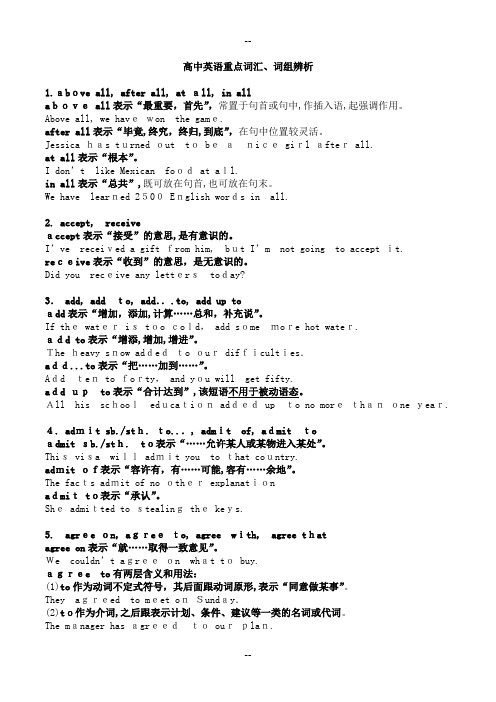
高中英语重点词汇、词组辨析1.above all, after all, at all, in allabove all表示“最重要,首先”,常置于句首或句中,作插入语,起强调作用。
Above all, we havewon the game.after all表示“毕竟,终究,终归,到底”,在句中位置较灵活。
Jessica has turned out to beanice girl after all.at all表示“根本”。
I don’t like Mexican food at all.in all表示“总共”,既可放在句首,也可放在句末。
We have learned 2500 English words in all.2. accept, receiveaccept表示“接受”的意思,是有意识的。
I’ve received a gift from him, but I’m not going to accept it.receive表示“收到”的意思,是无意识的。
Did you receive any letterstoday?3. add, add to, add...to, add up toadd表示“增加,添加,计算……总和,补充说”。
If the water is too cold, add some more hot water.add to表示“增添,增加,增进”。
The heavy snow addedto our difficulties.add...to表示“把……加到……”。
Add ten to forty, and you will get fifty.add upto表示“合计达到”,该短语不用于被动语态。
All his schooleducation added up to no morethanone year.4. admit sb./sth. to..., admit of, admit toadmit sb./sth. to表示“……允许某人或某物进入某处”。
高中英语重点词语辨析汇总(3)

高中英语重点词语辨析汇总(3)51.lie / lay(注意动词变化形式)动词原形过去式过去分词现在分词中文意思lie lay lain lying躺下;位于lie lied lied lying说谎lay laid laid laying安放;下蛋例259:The boy who lay on the table lied to me that the hen lying there laid two eggs that day.(躺在桌面上的那男孩对我撒谎说,蹲在那里的母鸡当天下了两个蛋。
)52.lie in / lie on / lie tolie in:位于(属于,包含其中)。
lie to:位于(不属于,隔开)。
lie on:位于(接壤,比邻关系)。
例如:例260:Fujian lies in the southeast of China, to the west of Taiwan, and on the east of Jiangxi.53.lose / misslose:丢失,失去;迷路。
例如:例261:She lost her way in the mist(雾).miss:丢失;不见;错过;遗漏;想念。
例如:例262:—When did you lose your purse? (你什么时候丢了钱包?)—I don’t know. When I got home, I found it missing.(不知道。
我到家时,发现钱包不见了。
)例263:It’s a very interesting film; you mustn’t miss it.(这是一部很有趣的电影,千万别错过了。
)54.prepare / prepare for / make preparations for / be prepared forprepare:准备。
prepare for / make preparations for (=get ready for):为……而准备。
高中英语重点辨析词语

中学英语重点辨析词语1. damage, harm, hurt, injure,ruindamage:主要指造成价值、效用、完整性方面的损坏,多用于无生命的东西。
The water they had thrown over everything to put out the fire damaged the books.harm:主要用于有生命的东西,间或也用于无生命的事物,常指伤及一个人的健康、权利、事业等。
Though he knows clearly that smoking harms his health, he simply cannot give it up.hurt:尤其指感情或身体遭遇创伤。
My little boy fell off a ladder and hurt himself.You hurt my feelings!injure:尤指在事故中受伤,或损害,损害名誉、自尊等。
Three people were killed and five injured in the crash..ruin: 破坏,使毁坏,这种破坏是使某物价值或用处失去。
My new shoes got ruined in the mud.2.can & be able to 都可以表示能够。
can 有实力做某事,只有现在式和过去式两种形式。
be able to表示要经过一番努力才能做到的事,可用于各种时态,不能用与can连用。
If I concentrate on the work, I'll be able to work out the problem.I'll be able to speak French in another few months.3.grateful to & grateful for 都表示感谢。
grateful to指对……表示感谢,其中的介词to表示对象,宾语通常是人或组织团体。
高中英语重点词汇辨析900例精校版直接打印

- 1 -高中英语重点词语辨析900例都有“指责,控告”之意,有时可通用,但结构不一样。
accuse 不一定针对重大过失或罪行,其结构为accuse sb of sth 。
而charge 一般用于重大过失或罪行,其结构为charge sb with sth ,此结构还有“使某人负有……责任”之意。
例如:例1:My father accused me of my being too careless. (父亲责备我太粗心。
) 例2:He accused me of neglecting my duty. (他指控我玩忽职守。
) 例3:He charged me with neglecting my duty. (同上)例4:Jimmy was charged with murder. (吉米被控谋杀。
)(他担负有一项重要任务。
) :把……加到。
例如: 例6:At the end of the party, we added another program. 例7:You needn’t add any water to the medicine.add to :增添。
指增添喜悦、悲伤、麻烦等。
例如:例8:His coming added to our trouble. (他的到来给我们添了麻烦。
)add up :加起来。
例如:例9:Have you added up all the numbers?add up to :总计。
表示加起来的结果,无被动结构。
例如:例11:I advised (his) trying again. (= suggest)例12:I advised that we (should) try again. (= suggest ,虚拟语气。
) 例13:I advised him to give up smoking. 例14:I advised him not to smoke.例15:Could you advise us on how to learn English?例16:Could you give us some advice on how to learn English?suggest :建议,表明,暗示。
常用高中英语词语辨析

常用高中英语词语辨析105组1.elder 与elderly两者都为“年老的”,但有细微的差别。
elderly 指中年与暮年之间的年龄,表示人已过中年,因此,这词常用来代替 old。
如:anelderly gentleman. 一位年长的绅士。
elder 指年龄稍长者,适用于家庭的兄弟姐妹之间。
如: Tom is the elder of the two. 汤姆是两个孩子中较大的一个。
2.precious 和 expensiveexpensive 表示“昂贵的”。
如:The drink was cheap , but the food was veryexpensive . 饮料很便宜,但食物很贵。
precious 表示“珍贵的,宝贵的”。
如:The children are precious to me . 孩子们对我来说很重要。
3.regret to do 和 regret doingregret doing 表示“做了某事而感到遗憾或后悔”,v-ing 动作发生在regret 之前。
如:Iregretted missing the train. 我为没有赶上火车而感到很懊恼。
regret to do 指“当时或现在遗憾地做什么”。
如:I regret to tell you that we can'tstay here any longer. 我遗憾地告诉你,我们不能在这儿多呆了。
4.day by day 和 day after day两词组意思很近,但有区别:day by day 只用作状语,表示“一天天地”,有逐渐转变的意思。
如:Day by day she seems to grow alittle taller.她似乎一天天地长高了。
day after day 可作主语,宾语等,亦可作状语,表示“一天又一天”,强调动作的重复,表示时间的长久。
如: We do the same work day afterday. 每天我们做着同样的事情。
最新高中英语词汇:常用英语词语辨析

最新高中英语词汇:常用英语词语辨析2017最新高中英语词汇:常用英语词语辨析高中英语词汇:常用英语词语辨析1.sure与certain两词都是表语性形容词,意为一定的,确实的(certain还可作定语),后接of/about,动词不定式和that引导的从句。
如:We are sure/certain of winning the game.我们确信会赢。
I'm not sure/certain about some of the English idioms.我对英语的某些成语没有把握。
We are sure/certain to win the game.我们一定会赢得比赛的胜利的。
She is sure/certain that his lecture will be warmly welcome.她确信他的讲座一定会受到热烈欢迎。
certain可以用于It is certain that…句式中,而sure则不可以。
如:It is certain(此处不能用sure) that the project will be a success.工程会成功,这是确定无疑的。
2.spend, pay与cost三词都作花费金钱解,差异如下:①spend与pay必须由人来作主语,而cost却由物(即it)来作主语,如:He has spent all his money on books.他把全部的钱都买了书。
During the next ten years we both worked night and day to pay for it.为了还债,10年来我们俩夜以继日地干活。
What will it cost me? It will cost you 20 dollars.这要花我多少钱?要花你20元钱。
②spend与pay搭的介词不一样,前者常与on连用,后者常与for连用。
而cost的花费,可以是金钱,还可是时间、精力或劳力等。
50个英语高级词汇,包含单词解析,同义词辨析和例句
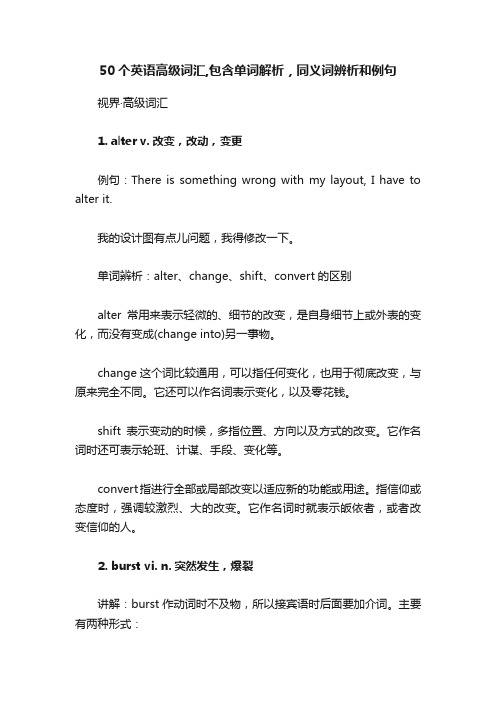
50个英语高级词汇,包含单词解析,同义词辨析和例句视界·高级词汇1. alter v. 改变,改动,变更例句:There is something wrong with my layout, I have to alter it.我的设计图有点儿问题,我得修改一下。
单词辨析:alter、change、shift、convert的区别alter常用来表示轻微的、细节的改变,是自身细节上或外表的变化,而没有变成(change into)另一事物。
change这个词比较通用,可以指任何变化,也用于彻底改变,与原来完全不同。
它还可以作名词表示变化,以及零花钱。
shift表示变动的时候,多指位置、方向以及方式的改变。
它作名词时还可表示轮班、计谋、手段、变化等。
convert指进行全部或局部改变以适应新的功能或用途。
指信仰或态度时,强调较激烈、大的改变。
它作名词时就表示皈依者,或者改变信仰的人。
2. burst vi. n. 突然发生,爆裂讲解:burst作动词时不及物,所以接宾语时后面要加介词。
主要有两种形式:burst into+n. / burst out+doing例句:Because of the sad news, she burst into tears. /she burst out crying.因为这个令人难过的消息,她大哭起来。
3. dispose vi. 除掉;处置;解决;处理(of)讲解:dispose作为不及物动词,其后接宾语时要加介词of。
例句:Mum ordered me to dispose of these unfashionable clothes.老妈命令我把这些过时的衣服处理掉。
4. blast n. 爆炸;气流 vi. 炸,炸掉讲解:blast作动词表示爆炸同explode,也可表示严厉批评(criticize),名词形式跟动词一致,相对应的近义词是explosion,criticism。
高中英语词汇辨析
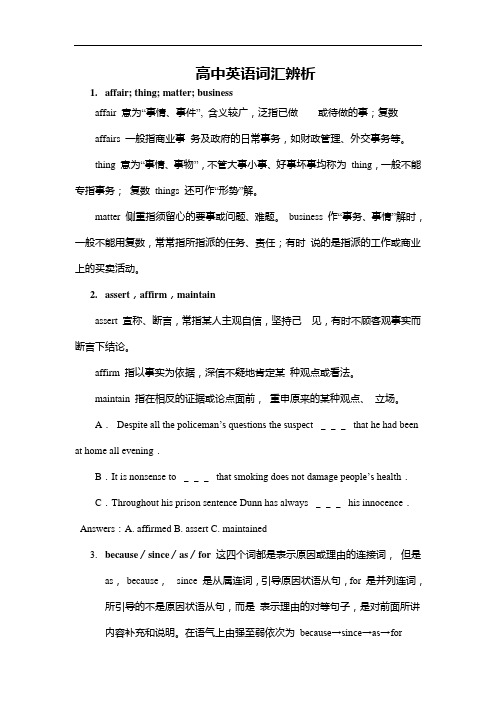
4. besides;except;but ;三者都可以用作介词。 用于肯定句中时, except/but 意为“除……外 (不再有) besides ”意为“除……外(还有)”。 请比较:A: All of them have seen the film except/but Wu Dong. 除了吴东 外,他们都看过了那部影片。B: All of them have seen the film besides Wu Dong. 除了吴东看过那部影片外, 他们也都看过了。 except 后接名词、代词、-ing 或不定式时,可以与 but 互换;except 后 接副词、介词 短语时,一般不能为 but 所替换。如: I’ll do everything except /but cook. 除了做饭,我什么事情都干。 This window is never opened except in summer. 除了在夏天,这个窗子从不打开。
高考英语50个高级词汇重点突破-优生必备(单词解析+同义词辨析+例句)
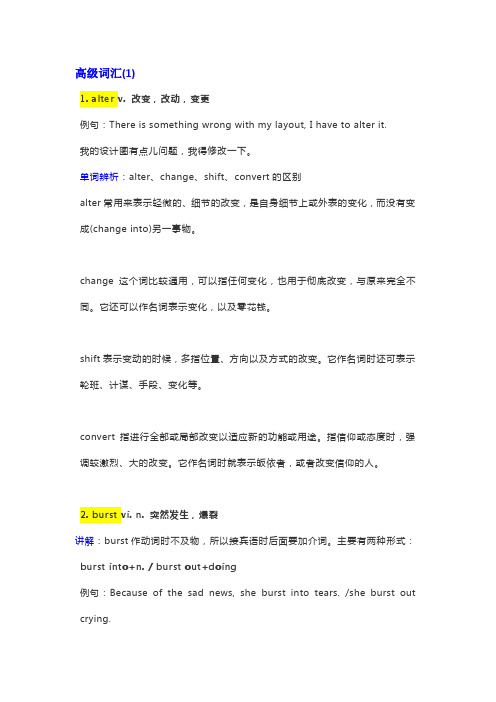
高级词汇(1)1. alter v. 改变,改动,变更例句:There is something wrong with my layout, I have to alter it.我的设计图有点儿问题,我得修改一下。
单词辨析:alter、change、shift、convert的区别alter常用来表示轻微的、细节的改变,是自身细节上或外表的变化,而没有变成(change into)另一事物。
change这个词比较通用,可以指任何变化,也用于彻底改变,与原来完全不同。
它还可以作名词表示变化,以及零花钱。
shift表示变动的时候,多指位置、方向以及方式的改变。
它作名词时还可表示轮班、计谋、手段、变化等。
convert指进行全部或局部改变以适应新的功能或用途。
指信仰或态度时,强调较激烈、大的改变。
它作名词时就表示皈依者,或者改变信仰的人。
2. burst vi. n. 突然发生,爆裂讲解:burst作动词时不及物,所以接宾语时后面要加介词。
主要有两种形式:burst into+n. / burst out+doing例句:Because of the sad news, she burst into tears. /she burst out crying.因为这个令人难过的消息,她大哭起来。
3. dispose vi. 除掉;处置;解决;处理(of)讲解:dispose作为不及物动词,其后接宾语时要加介词of。
例句:Mum ordered me to dispose of these unfashionable clothes.老妈命令我把这些过时的衣服处理掉。
4. blast n. 爆炸;气流vi. 炸,炸掉讲解:blast作动词表示爆炸同explode,也可表示严厉批评(criticize),名词形式跟动词一致,相对应的近义词是explosion,criticism。
例句:Fortunately, no people injured in the blast.幸运的是,爆炸没有造成人员伤亡。
高级英语近义词辨析整理

高级英语近义词辨析整理第1 课1.destroy一词最为常见,主要强调破坏的力度之大和彻底,一般不带感情或修辞色彩。
demolish和raze通常用于巨大物体,如大型建筑物等。
demolish常用引申义,指任何复合体的被毁,如demolish a theory with a few incisive comments。
意即“用几句锋利的评语推翻某种理论”。
而raze几乎无一例外地用于指建筑物的被毁。
annihilate在这些词中所表示的损坏程度最为强烈,字面意思是“化为乌有”,但实际上往往用于指对人或物的严重损伤。
如说annihilate an enemy force,是指使敌军遭到重创,不仅没有还手之力。
而且没有招架之功。
如说annihilate one?s opponent in a debate,是指彻底驳倒对手。
2. decay常指某物自然而然地逐渐衰败腐化。
如:His teeth have begun to decay.(他的牙齿开始老化变坏。
)rot指有机物质,如蔬菜等因菌毒感染而腐败变质,如:rotting apples(烂了的苹果)。
spoil用于非正式文体,常指食物变质。
如:Fish spoils quickly in summer。
(鱼在夏天极易变质。
)molder用于指物体缓慢、逐步地腐朽。
如:Old buildings molder away.(老房子渐渐腐烂了。
)disintegrate意指把某物从整体变为碎片或一个个部分。
如:rocks disintegrated by frost and rain(被霜和雨蚀裂成碎块的岩石)。
decompose指将物质分解为其构成成分。
如:Water can be decomposed(be decomposed)into hydrogen and oxygen.(水可分解成氧和氧。
)该词还可用来替代rot,使语气略显委婉。
在给出答案之前,首先将该题中的几个语法术语解释一下。
高英词义辨析

glisten、glitter、flash、shimmer、sparkleflash:to shine suddenly and brightly for a short time, orto make something shine in this way; If a light flashes or if you flash a light, it shines with a sudden bright light, especially as quick, regular flashes of light.例:Lightning flashed overhead.Flash是快速地发出强光,意为"闪光",是闪光一族的普通意义,后文还有多个闪光词汇。
mortal、fatal、deadly、lethalFatal是用以描写任何足以致死或确已致死的事物;强烈暗示命运之不可逃避。
例如:an illness which might not be serious for a young person, but which all almost certainly prove fatal to the old lady(对一位年轻人可能不算严重而对这位老妇人则几乎一定可以致死的病).Deadly在这意义上,可与fatal交换使用。
例如:Leukaemi a is a deadly disease (白血球过多症是可以致死的病).Deadly可指想要致人于死的人或物,而fatal 则不能。
例如:The murdered man had many deadly enemies(这被害人有许多死敌).Mortal和deadly相似,可适用于致死、能致死或企图致人于死的人或物。
例如:Because of an ancient family feud, the two cousins had been mortal enemies from birth(因家庭宿仇,这两个堂兄弟生来就成为死敌).用于物,mortal与fatal和deadly之不同仅在于mortal通常用以详述业已发生的命案中的细节。
高级英语词汇辨析部分版
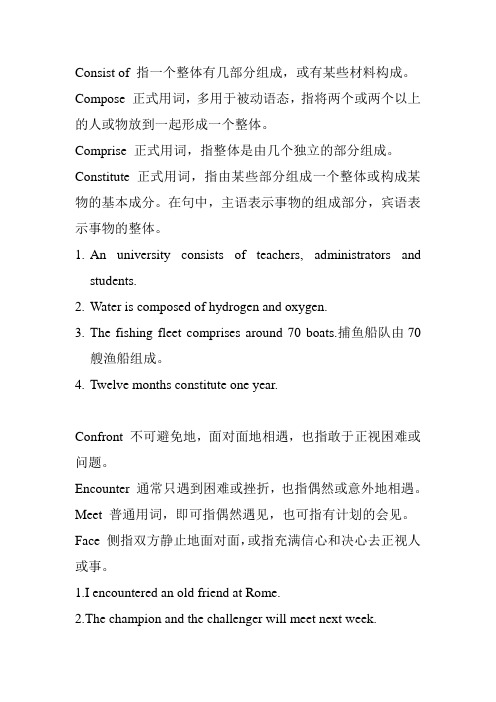
Consist of 指一个整体有几部分组成,或有某些材料构成。
Compose 正式用词,多用于被动语态,指将两个或两个以上的人或物放到一起形成一个整体。
Comprise 正式用词,指整体是由几个独立的部分组成。
Constitute 正式用词,指由某些部分组成一个整体或构成某物的基本成分。
在句中,主语表示事物的组成部分,宾语表示事物的整体。
1.An university consists of teachers, administrators andstudents.2.Water is composed of hydrogen and oxygen.3.The fishing fleet comprises around 70 boats.捕鱼船队由70艘渔船组成。
4.Twelve months constitute one year.Confront 不可避免地,面对面地相遇,也指敢于正视困难或问题。
Encounter 通常只遇到困难或挫折,也指偶然或意外地相遇。
Meet 普通用词,即可指偶然遇见,也可指有计划的会见。
Face 侧指双方静止地面对面,或指充满信心和决心去正视人或事。
1.I encountered an old friend at Rome.2.The champion and the challenger will meet next week.3.A solider has to confront danger.4.He must face the fact that he is no longer young.Demolish 彻底拆毁或毁坏,也常常用来比喻将整体拆散。
Destroy 比较常用,指使用任何力量破坏或毁灭,并难以恢复。
1.They have demolished the slum district.贫民区已被拆除。
2.During the war, many building were destroyed.Throng 主要用于书面语,尤指人流拥挤,攒动,一个推着一个向前涌动。
高级英语词汇区别总结

26. on the whole as a whole
On the whole:总的看来,大体上,指对多个事物权衡后得出结论
As a whole:作为一整体,整个看来,前面往往有一个表示集体意义的名词。
I think, on the whole, we had better stay at home.
He is confined to his berth by seasickness.
Try to limit your talk to ten minutes.
28. justifiable justified
Justifiable:指在法律和道义上可证明为正当的,无可非议的,情有可原的
Justified:指有理由,合情合理的,正当的。
Contented:表示心满意足,不想再多要。
He was content that the thing had happened.
Don’t be contented with little success.
14. perseverance persistence
Perseverance:含不屈不挠和执着的意味,强调积极的忍耐,运用耐力排除各种困难
19. scrub scrape
Scrub:指用力擦洗,擦净,一般用水、毛巾、刷子等。
Scrape:指用工具刮,刮削,削掉,刮磨。
He is scrubbing the floor.
Before eating, scrape the mould from the surface.
20. ingenuous ingenious
高级词汇的词义辨析

高级词汇的词义辨析高级词汇在英语写作和口语表达中扮演着重要角色。
然而,由于其词义相似或相近,使用时往往容易引起困惑。
为了帮助读者准确区分这些高级词汇的具体意义,本文将介绍几组常用高级词汇,并对其词义进行辨析。
1. Borrow、Lend、Loan这三个词在表达“借”的意义上经常容易混淆。
它们的区别如下:- Borrow:指向他人借用某物。
例如:“Can I borrow your pen?”(我可以借用你的笔吗?)- Lend:指将某物借给他人。
例如:“Could you lend me your book?”(你能把书借给我吗?)- Loan:指借款或贷款的行为。
例如:“I applied for a loan from the bank.”(我向银行申请了贷款。
)2. Accept、Except这两个词在发音上非常相似,但在意义上却截然不同。
- Accept:表示接受、同意或认可。
例如:“I accept your offer.”(我接受你的提议。
)- Except:表示除了、排除在外。
例如:“Everyone is going on the trip except John.”(除了约翰,大家都要去旅行。
)3. Affect、EffectAffect和Effect都是动词,但它们有不同的意义。
- Affect:表示影响或对某人或某物产生作用。
例如:“The noise affected my concentration.”(噪音影响了我的注意力。
)- Effect:表示结果、影响或效果。
例如:“The new policy had a positive effect on the economy.”(新政策对经济产生了积极影响。
)4. Principal、Principle这两个词既可以作形容词,也可以作名词。
- Principal:作形容词时,表示“主要的”或“最重要的”。
作名词时,表示“校长”或“负责人”。
- 1、下载文档前请自行甄别文档内容的完整性,平台不提供额外的编辑、内容补充、找答案等附加服务。
- 2、"仅部分预览"的文档,不可在线预览部分如存在完整性等问题,可反馈申请退款(可完整预览的文档不适用该条件!)。
- 3、如文档侵犯您的权益,请联系客服反馈,我们会尽快为您处理(人工客服工作时间:9:00-18:30)。
1. The whole nation watched the two candidates (arguing, debating) the issue of raising taxes on TV.Argue: (transitive) to state, giving clear reasons, that something is true, should be done etc Debate: (transitive) to discuss a subject formally when you are trying to make a decision or find a solution2. It was a (proud, arrogant) moment for my cousin when she shook hands with the President. Proud: feeling pleased about something that you have done or something that you own, or about someone or something you are involved with or related toArrogant: behaving in an unpleasant or rude way because you think you are more important than other people3. Even if you (mix, blend) oil and water, they will not (mix, blend).Mix: if you mix two or more substances or if they mix, they combine to become a single substance, and they cannot be easily separatedBlend: to combine different things in a way that produces an effective or pleasant result, or to become combined in this way4. Some people watch television so much that they cannot (conceive, imagine) of living without it. Conceive: (formal) to imagine a particular situation or to think about something in a particular wayImagine; to form a picture or idea in your mind about what something could be like5. As it was an informal dinner, most people (wore, were dressed) in their comfortable clothes. Wear: [transitive] to have something such as clothes, shoes, or jewellery on your bodyDress: to put clothes on yourself or someone else (一般跟IN搭配)6. Do you think those young people are (idealistic, ideal) or pragmatic?Idealistic: believing that you should live according to high standards and principles, even if they cannot really be achieved, or showing this beliefIdeal: the best or most suitable that something could possibly be7. Filled with great (adulation, admiration) for their integrity and courage, e was determined to bea man like them.Adulation: praise and admiration for someone that is more than they really deserve Admiration: a feeling of great respect and liking for something or someone8. Deep at night, they could still hear gun-fire (rambling, rumbling) in the distance.Ramble: to talk for a long time in a way that does not seem clearly organized, so that other people find it difficult to understand you(漫谈); To go on a walk in the countryside for pleasure Rumble: to make a series of long low sounds, especially a long distance away from you9. The professor looked over our papers with a hasty (sight, glance).Sight: the act of seeing somethingGlance: to quickly look at someone or something10. Before ordering their dinner, they considered the (relevant, relative) merits of chicken and roast beef.Relevant: directly relating to the subject or problem being discussed or considered(强调与一方相关)Relative: having a particular quality when compared with something else(强调比较)11. the little boy’s constant noise (exhilarated, exasperated) his father, who was busy writing a paper for a symposium(座谈会).Exhilarate: to make someone feel very excited and happyExasperate: to make someone very annoyed by continuing to do something that upsets them12. isn’t it (wholesome, noisome) to live in a city with so many vehicles passing day and night? Wholesome: likely to make you healthyNoisome: very unpleasant13. He was born in a small town (lived, inhabited) by about 500 people.Live: if you live in a place, you have your home thereInhabit: if animals or people inhabit an area or place, they live there14. Her desk was all (jumbled, cluttered) with old papers, strings, and other odds and ends. Jumble: to mix things together in an untidy way, without any order(及物动词经常用于被动,不能作表语)Clutter: to cover or fill a space or room with too many things, so that it looks very untidy(与with 搭配)odds and ends: small things of various kinds without much value(零星东西)15. He thinks they are extremely (idealistic, ideal), for all their pragmatism.Idealistic, ideal: see number 616. She made one last (attraction, appeal) to her father for permission to go to the party. Attraction: a feeling of liking someone, especially in a sexual way(强调双方相互吸引) Appeal: a quality that makes people like something or someone(强调一方吸引另一方)17. The girl looked at the doctor (terrifyingly, terrified).Terrifyingly: extremely frightening; scary(表主动)Terrified: very frightened; scared(表被动)18. “If you finish all the homework tonight, we’ll go for a picnic tomorrow,” he (admonished, coaxed).Admonish: (formal) to tell someone severely that they have done something wrongCoax: to persuade someone to do something that they do not want to do by talking to them in a kind, gentle, and patient way19. He thought their behavior was (contemptuous, contemptible), but he didn’t say anything in front of the host.Contemptuous: showing that you think someone or something deserves no respect Contemptible: not deserving any respect at all20. Summoned by the boss, he approached his office full of (apprehension, distrust). Apprehension: anxiety about the future, especially about dealing with something unpleasant or difficult; anxietyDistrust: a feeling that you cannot trust someone21. He was sincerely sorry for what happened at the party, so people accepted his (excuse, apology).Excuse: a reason that you give to explain careless or offensive behavior; a reason that you invent to explain an action and to hide your real intentionsApology: something that you say or write to show that you are sorry for doing something wrong22. They were walking in the forest when they heard a (terrifying, terrific) roar, which made their blood freeze.Terrifying: extremely frighteningTerrific: (informal) very good, especially in a way that makes you feel happy and excited;very large in size or degree(在尺寸和程度上很大)23. Obviously they were getting nowhere with the meeting, so he decided to (desist, resist) from making a final decision that afternoon.Desist: (formal) to stop doing something (跟from搭配)Resist: to stop yourself from having something that you like very much or doing something that you want to do(后面直接加动名词)24. “How can you say that you don’t want to see your grandmother” the fatter (admonished, coaxed).Admonish, coax: see number 1825. The warrior managed to (evade, dodge) the arrow that came flying through the air.Evade: to avoid talking about something, especially because you are trying to hide something(避而不谈); to escape from someone who is trying to catch you(逃避)Dodge: to move quickly to avoid someone or something26. They speaker’s last few words were (drowned out, stopped) by the audience’s thunderous applauses.Drown out: if a loud noise drowns out another sound, it prevents it from being heardStop: prevent, not continue27. Would I be (intruding, invading) if I joined in your discussion?Intrude: to interrupt someone or become involved in his or her private affairs in an annoying and unwanted wayInvade: to enter a country, town, or area using military force, in order to take control of it28. The (omission, exclusion) of a full stop at the end of the sentence is a deliberate act by the writer.Omission: when you do not include or do not do somethingExclusion: when someone is not allowed to take part in something or enter a place29. The newly-recruited soldiers swore an (oath, promise) of loyalty to their countryOath: a formal and very serious promisePromise: to tell someone that you will definitely do or provide something or that something will happen30. The suspect was accused of (preventing, withholding) some important evidence from the court. Prevent: to stop something from happening, or stop someone from doing somethingWithhold: to refuse to give someone something(隐瞒)31. Whether or not he is the best person for the promotion is (debatable, arguable).Debatable: things that are debatable are not certain because people have different opinions about themArguable: not certain, or not definitely true or correct, and therefore easy to doubt32. He has established himself as a (credible, believable) businessman.Credible: deserving or able to be believed or trusted(可形容人或事)Believable: something that is believable can be believed because it seems possible, likely, or real(只能形容事)33. His story of having discovered the treasure buried by some pirates seemed (incredible, incredulous) to everyoneIncredible: too strange to be believed or very difficult to believeIncredulous: unable or unwilling to believe something34. “But the piano is out of (tone, tune)”, she said in a disappointed (tone, tune).Tone: the way your voice sounds, which shows how you are feeling or what you meanTune: a series of musical notes that are played or sung and are nice to listen to35. Her friends expressed great (sympathy, empathy) to her when her mother died.Sympathy: the feeling of being sorry for someone who is in a bad situation(表具体)Empathy: the ability to understand other people's feelings and problems(表抽象)36. They are now enjoying a short (vocation, vacation) at the seashore.V ocation: the feeling that the purpose of your life is to do a particular type of work, especiallybecause it allows you to help other people(尤指一种能够帮助他人的职业,比如说教师等) Vacation: a holiday, or time spent not working37. A (content, contented) person is one who is happy with what he has.Content: happy and satisfied(因为别人的原因而使你感到满意)Contented: happy and satisfied because your life is good(因为自己的原因而使你感到满意)38. All the streets will be (eliminated, illuminated) tomorrow evening for the celebration. Eliminate:to completely get rid of something that is unnecessary or unwanted(有除掉敌人或淘汰比赛对手意思)Illuminate: to make a light shine on something, or to fill a place with light(原意为照亮,另有阐明的意思)39. Her (perseverance, persistence) in wearing that old-fashioned hat surprised her husband. Perseverance: determination to keep trying to achieve something in spite of difficulties(坚毅) Persistence: determination to do something even though it is difficult or other people oppose it(坚持或固执)40. The effect of the officer’s speech was such that the army recovered it’s (moral, morale) at once. Moral: relating to the principles of what is right and wrong behavior, and with the difference between good and evil(道德)Morale: the level of confidence and positive feelings that people have, especially people who work together, who belong to the same team etc(士气)41. South Africa used to be a country where black people and white people were (separated, segregated).Separate: to divide or split into different parts, if something separates two places or two things, it is between them so that they are not touching each otherSegregate: to separate one group of people from others, especially because they are of a different race, sex, or religion(尤指种族隔离)42. The letter from her sister so (embittered, agitated) her that she stayed awake half the night, trying to think of a way to get back at her.Embitter: angry, sad, or full of hate because of bad or unfair things that have happened to you Agitate: (formal) to make someone feel anxious, upset, and nervous(使不安,另有煽动的意思) Get back at sb.: to do something to hurt or harm someone who has hurt or harmed you43. You haven’t seen him for over a year?” he sounded (incredible, incredulous).Incredible: too strange to be believed or very difficult to believe(表示一种怀疑的态度) Incredulous: unable or unwilling to believe something(表示虽然不愿相信但承认事实)44. No matter what he said, the only response he got from him was a (noncommittal, tentative) “I see”Noncommittal: deliberately not expressing your opinion or intentions clearly(不明朗的)Tentative: not definite or certain, and may be changed later(暂时,试验性的)45. That plan was too (untrue, unrealistic) to be adopted.Untrue: not based on facts that are correctUnrealistic: unrealistic ideas or hopes are not reasonable or sensible46. When people looked at him too (intently, tentatively), he felt very uncomfortable.Intently: giving careful attention to something so that you think about nothing else Tentatively: not definite or certain, and may be changed later(暂时,试验性的)47. Since she didn’t know anybody in that city, she was rather (hesitant, tentative) when accepting the job offer.Hesitant: uncertain about what to do or say because you are nervous or unwillingTentative: done without confidence(这是tentative的第二个意思)48. “Do you really think he will give up the position?” he (scoffed, scold).Scoff: to laugh at a person or idea, and talk about them in a way that shows you think they are stupid; make fun ofScold: to angrily criticize someone, especially a child, about something they have done49. She told the children about her life on the farm all those years ago, how she (got used to, used to) get up at four every morning to milk the cows.Get used to: to have experienced something so that it no longer seems surprising, difficult, strange etcUsed to: if something used to happen, it happened regularly or all the time in the past, but does not happen now50. The teacher told the boys first to (pour, splash) some water on the floor before mopping it. Pour: to make a liquid or other substance flow out of or into a container by holding it at an angle Splash: to make someone or something wet with a lot of small drops of water or other liquid CF: sprinkle51. When he was discovered, the pick-pocket (waved, flapped) a knife to threaten the people around him.Wave: to raise your arm and move your hand from side to side in order to make someone notice youFlap: to move quickly up and down or from side to side, often making a noise52. The eagle suddenly (drifted, swooped) down and snatched the piece of meat.Drift: to move slowly on water or in the airSwoop: if a bird or aircraft swoops, it moves suddenly down through the air, especially in order to attack something53. With the help of the specially trained dogs, they were able to (rescue, save) ten people buriedin the snow.Rescue: to save someone or something from a situation of danger or harm(强调营救的过程) Save: to make someone or something safe from danger, harm, or destruction(强调安全)54. His feet were numb with cold; as soon as he got into the room he started (rubbing, stroking) them vigorously.Rub: to move your hand, or something such as a cloth, backwards and forwards over a surface while pressing firmlyStroke: to move your hand gently over somethingNumb means unable to feel anything55. The kitchen floor has to be (scrubbed, scraped) every other day.Scrub: to rub something hard, especially with a stiff brush, in order to clean itScrape: to rub against a rough surface in a way that causes slight damage or injury, or to make something do this56. Every night before he went to bed, he (made a point, made a plan) of checking all the doors and windows.Made a point: to do something deliberately, even when it involves making a special effortMade a plan: plan to do something57. Students of English are required to (remember, memorize) the listed 2000 words. Remember: to have a picture or idea in your mind of people, events, places etc from the past Memorize: to learn words, music etc so that you know them perfectly58. You should not be (intolerable, intolerant) of different religious beliefs.Intolerable: too difficult, bad, annoying etc for you to accept or deal with(句子主语表示动作的对象)Intolerant: not willing to accept ways of thinking and behaving that are different from your own59. He tried to (infuse, fill) the awkward situation with humor.Infuse: (formal) to fill something or someone with a particular feeling or quality(表抽象)跟with 搭配Fill: if a container or place fills, or if you fill it, enough of something goes into it to make it full(表具体)60. We have a sense of working towards a (common, ordinary) goal.Common: common aims, beliefs, ideas etc are shared by several people or groups(这是common 特有的意思表示共同的)Ordinary: average, common, or usual, not different or special61. The virus can only be transmitted through (familiar, intimate) contact.Familiar: someone or something that is familiar is well-known to you and easy to recognize Intimate: relating to sex(在本句中的意思) ;Private and friendly so that you feel comfortable62. It suddenly (happened, occurred) to him that he had worked for twelve hours without eating anything.Happen: if you happen to do something, you do it by chanceOccur: if an idea or thought occurs to you, it suddenly comes into your mind63. The students waited in (respectable, respectful) silence for the Noble Prize winner to make his speech.Respectable: someone who is respectable behaves in a way that is considered socially acceptable Respectful: feeling or showing respect64. The children suffer most when their parents (divide, separate).Divide: if something divides, or if you divide it, it separates into two or more partsSeparate: if two people who are married or have been living together separate, they start to live apart65. The teacher (allotted, divided) the children into several small groups for the trip to the Palace Museum.Allot: to use a particular amount of time for something, or give a particular share of money, space etc to someone or somethingDivide: if something divides, or if you divide it, it separates into two or more parts66. Around mid-night, she received a (mysterious, miraculous) phone call from someone she did not know of.Mysterious: mysterious events or situations are difficult to explain or understandMiraculous: very good, completely unexpected, and often very lucky67. Do you think soil samples are (obtainable, absorbable) from the Mars by an unmanned aircraft in the near future?Obtainable: able to be obtainedAbsorbable:可吸收的,容易吸收的68. She was so dear to him that he still kept her picture in a (preeminent, prominent) position on his desk.Preeminent:优秀超群的Prominent: something that is in a prominent place is easily seen69. Soft background music will (enhance, increase) a delicious meal.Enhance: to improve somethingIncrease: if you increase something, or if it increases, it becomes bigger in amount, number, or degree70. He was so disappointed when the manager said that his plan was completely (dismissible, disposable).Dismissible: not deserving to be consideredDisposable: intended to be used once or for a short time and then thrown(一次性) available to be used(可再生的)71. The baby-sitter kept the kids (accompanied, company) until we got back from the theater. Accompany: to go somewhere with someoneCompany:固定搭配keep… company= be with her so that she doesn't feel lonely与谁做伴72. Will the financial (reverse, adverse) prevent you from taking a holiday this summer? Reverse: the exact opposite of what has just been mentionedAdverse: not good or favorable73. The (distribution, allotment) of funds to these universities is decided by the Ministry of Education.Distribution: the act of sharing things among a large group of people in a planned way(普通的分配)Allotment: an amount or share of something such as money or time that is given to someone or something, or the process of doing this(尤指上下级之间的分配)74. The employees are openly (contemptuous, contemptible) of their corrupt manager. Contemptuous, Contemptible: see number 1975. The gardener was asked to cut the bushes (even, equal) with the fence.Even: flat and level, with no parts that are higher than other parts (作形容词表示与持平的) Equal: the same in size, number, amount, value etc as something else76. His handwriting was so tiny that it was hardly (readable, legible).Readable: interesting and enjoyable to read, and easy to understand(因有趣味而可读的) Legible: written or printed clearly enough for you to read(因书写印刷清晰而可读的)77. The (shameful, shameless) family secret was brought to light.Shameful: shameful behavior or actions are so bad that someone should feel ashamed(形容行动或事件)Shameless: not seeming to be ashamed of your bad behavior although other people think you should be ashamed(只能形容人)78. The bus came to a (quick, abrupt) stop, and some passengers lost their balance.Quick: lasting for or taking only a short timeAbrupt: sudden and unexpected79. Mary aired her (grievances, grief) at not being treated fairly by the salesperson. Grievances: a belief that you have been treated unfairly, or an unfair situation or event that affects and upsets you(委屈,冤情)Grief: extreme sadness, especially because someone you love has died80. He felt (daunted, discouraged) by the enormous difficulties involved in completing the construction of the airport in one year.Daunt: to make someone feel afraid or less confident about somethingDiscouraged: no longer having the confidence you need to continue doing something81. There is a (contrariness, contradiction) between what he says and what he does. Contrariness: someone who is contrary deliberately does different things from other people (contrary特有的意思)Contradiction: a difference between two statements, beliefs, or ideas about something that means they cannot both be true82. It was in the (dark, dim) light of the early dawn that I saw a man moving towards me.Dark: if it is dark, there is little or no lightDim: fairly dark or not giving much light, so that you cannot see well83. The poor, sick man is (abused, tormented) by the policeman’s endless interrogation. Abuse: to treat someone in a cruel and violent way, often sexually(虐待尤指性方面的); to deliberately use something for the wrong purpose or for your own advantage(滥用)Torment: to make someone suffer a lot, especially mentallyInterrogate: to ask someone a lot of questions for a long time in order to get information, sometimes using threats84. Too much food (induces, tempts) sleepiness.Induce: (formal) to persuade someone to do something, especially something that does not seem wise; formal to cause a particular physical condition(这是本句的意思)Tempt: to try to persuade someone to do something by making it seem attractive;85. He (wondered, mediated) for a whole week before making that important decision. Wonder: to think about something that you are not sure about and try to guess what is true, what will happen etcMediate: to try to end a quarrel between two people, groups, countries etc(在本句中表示思量考虑)86. A (n) (literal, exact) translation is not always the best.Literal translation: a translation that translates each word exactly instead of giving the general meaning in a more natural wayExact: completely correct in every detail87. The author declares that the plot and characters of the novel are (imaginary, imaginative). Imaginary: not real, but produced from pictures or ideas in your mind(虚拟的,虚构的) Imaginative: containing new and interesting ideas or good at thinking of new and interesting ideas(富于想象的,爱想象的)CF imaginable: used to emphasize that something includes every possible example ofsomething(可以想象到的)88. We walked for miles along the (twisted, crooked) path in the forest.Twisted: something twisted has been bent in many directions or turned many times, so that it has lost its original shapeCrooked: bent, twisted, or not in a straight line89. We advise girls below twenty not to marry, because they are still emotionally (naive, immature).Naive: not having much experience of how complicated life is, so that you trust people too much and believe that good things will always happenImmature: someone who is immature behaves or thinks in a way that is typical of someone much younger - used to show disapproval90. Her feelings (fluctuated, changed) between excitement and fear.Fluctuate: if a price or amount fluctuates, it keeps changing and becoming higher and lower(与WITH搭配)Change: to become different, or to make something become different91. The police will not hesitate to use (force, compulsion) if they bank robbers still refuse to surrender.Force: violent physical action used to get what you wantCompulsion: a strong and unreasonable desire to do something92. After twenty years of antagonism, the two countries were finally (reconciled, friendly). Reconcile: if you reconcile two ideas, situations, or facts, you find a way in which they can both be true or acceptable(和解)Friendly: behaving towards someone in a way that shows you like them and are ready to talk to them or help them93. To call the air strikes against Yugoslavia peace-keeping is a (downright, thorough) lie. Downright: used to emphasize that something is completely bad or untrueThorough: including every possible detail94. “As red as blood” is a (metaphor, simile)Metaphor: a way of describing something by referring to it as something different and suggesting that it has similar qualities to that thing(隐喻)Simile: an expression that describes something by comparing it with something else, using the words 'as' or 'like', for example 'as white as snow(明喻)95. The sight of the snake gave me the (trembling, shivers).Trembling: shaking slightly in a way that you cannot control, especially because you are upset or frightenedShiver: give sb. The shivers=informal to make you feel afraid(固定搭配,除此以外trembling和shiver同义词)96. Although the children found the fables most (readable, understandable), they sometimes missed the messages of the stories.Readable:见No.76Understandable: seem normal and reasonable because of the situation you are in97. The office buildings with their (desirable, desired) locations are very much in demand. Desirable: something that is desirable is worth having or doing(正式用法)Desired: to want to have sex with someone(文学上特指这个意思)98. Driving after drinking Whiskey (is about, is apt) to cause traffic accidents.Be about to: if someone is about to do something, or if something is about to happen, they will do it or it will happen very soonBe apt to: to have a natural tendency to do something99. I don’t want the (actual, literal) meaning of the word, I’m asking you its figurative sense here. Actual: used to emphasize that something is real or exact(强调确切的,事实的); used to introduce the most important part of an event or activity(强调实质上的)Literal: the literal meaning of a word or expression is its basic or original meaning100. In that part of the world the summer weather is so (varied, variable) that even when the sun is shining brightly you never can be sure if it is g oing to rain in an hour’s time.Varied: consisting of or including many different kinds of things or people, especially in a way that seems interestingVariable: likely to change often。
